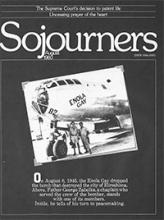(SOMETIME IN THE FUTURE--)
The government is worried. Used to be that the churches were satisfied with issuing statements and declarations on world peace. Everyone knew they didn't mean very much; church members were as scared of the Russians as everybody else. Christians, too, wanted to hang on to the style of life they had become accustomed to in this country. They were as glad for the nuclear arsenal as the rest of us, no matter what their church offices in New York and Washington said.
Anyway, their denominational leaders had church money invested in the big weapons companies. They paid their war taxes and fought for power and influence just as hard as all the other lobby groups in Washington, D.C. The only real difference between the church lobbies and the National Rifle Association was that the churches couldn't deliver their constituency.
That was before it all happened. They say it's a revival--just like what happened more than a hundred years ago when a lot of Christians turned against slavery. Whatever it is, it's got the government worried.
Evangelists are springing up all over. They're preaching the gospel and saying that our country's nuclear policy is a sin. A sin, mind you, not merely a social or political problem.
It's idolatry, they say, to put your own nation ahead of the lives of millions of other people. They're going all over the country saying that to turn to Jesus means to turn away from nuclear weapons.
The Christians are no longer happy just to give the government good advice about international cooperation. They say they must first put their own house in order. Pastors are telling people that the Lord wants them to quit supporting the arms race. And the people are quitting.
Read the Full Article

